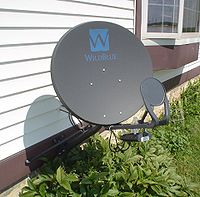Satellite internet

Imagine that you live in a house in the middle of nowhere, with no telephone lines, no fiber-optic cables, and no cellular service. You want to be able to get online, watch videos, play games, and communicate with others. How can you do that? One option is satellite internet.
Satellite internet works by sending and receiving signals from space. There are satellites orbiting the Earth that act like giant routers (or gateways) between your home and the internet. These satellites are equipped with antennas and transponders that can pick up signals from your computer or modem and beam them back down to Earth.
To use satellite internet, you need a few things:
- A modem: This is a device that connects to your computer or router and sends and receives signals to and from the satellite.
- A dish: This is a satellite dish (like the kind you see on top of some TV sets) that receives signals from the satellite and sends them to the modem.
- A clear view of the sky: The satellite dish needs to be able to "see" the satellite in space, so it needs to be installed in a location where there are no trees, buildings, or other obstacles in the way.
Once you have these things set up, you can connect to the internet just as you would with any other type of internet service. You can browse the web, download files, stream videos, and use online apps and services.
However, there are a few limitations and drawbacks to satellite internet that you should be aware of:
- Latency: This is the time it takes for signals to travel from your computer to the satellite and back. Because satellites are far away from Earth (they orbit at around 22,000 miles), it can take a couple of seconds for signals to make the round trip. This can make some online activities, such as online gaming or video conferencing, difficult or frustrating.
- Data limits: Satellite internet providers typically impose monthly data limits, meaning you can only use a certain amount of data each month. If you go over this limit, your speeds may be slowed down or you may be charged extra fees.
- Weather interference: Heavy rain, snow, or cloud cover can sometimes interfere with satellite signals, causing your internet connection to drop or slow down.
Overall, satellite internet can be a good option for people who live in rural or remote areas where other types of internet service are not available. However, it may not be the best choice for everyone, depending on their needs and the limitations of the technology.
Satellite internet works by sending and receiving signals from space. There are satellites orbiting the Earth that act like giant routers (or gateways) between your home and the internet. These satellites are equipped with antennas and transponders that can pick up signals from your computer or modem and beam them back down to Earth.
To use satellite internet, you need a few things:
- A modem: This is a device that connects to your computer or router and sends and receives signals to and from the satellite.
- A dish: This is a satellite dish (like the kind you see on top of some TV sets) that receives signals from the satellite and sends them to the modem.
- A clear view of the sky: The satellite dish needs to be able to "see" the satellite in space, so it needs to be installed in a location where there are no trees, buildings, or other obstacles in the way.
Once you have these things set up, you can connect to the internet just as you would with any other type of internet service. You can browse the web, download files, stream videos, and use online apps and services.
However, there are a few limitations and drawbacks to satellite internet that you should be aware of:
- Latency: This is the time it takes for signals to travel from your computer to the satellite and back. Because satellites are far away from Earth (they orbit at around 22,000 miles), it can take a couple of seconds for signals to make the round trip. This can make some online activities, such as online gaming or video conferencing, difficult or frustrating.
- Data limits: Satellite internet providers typically impose monthly data limits, meaning you can only use a certain amount of data each month. If you go over this limit, your speeds may be slowed down or you may be charged extra fees.
- Weather interference: Heavy rain, snow, or cloud cover can sometimes interfere with satellite signals, causing your internet connection to drop or slow down.
Overall, satellite internet can be a good option for people who live in rural or remote areas where other types of internet service are not available. However, it may not be the best choice for everyone, depending on their needs and the limitations of the technology.
Related topics others have asked about:
